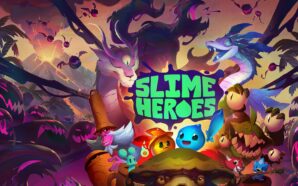I love a good puzzle game but time-and-time again I find myself losing interest, either because of the difficulty (and I admit, I’m terrible at adapting to in-game logic) or because the game feels like a series of minigames that lack focus or direction. Focus or direction is important to me because I want to feel like I’ve achieved something after sinking X amount of time into a game. Difficulty is important to me because the experience needs to be challenging but also achievable. When the two don’t align my attention wains and I eventually stop enjoying myself. This is what happened when I played Degrees of Separation.
THE STORY
The story is quite cute actually. The two characters are Ember and Rime. Ember’s abilities are centred on warmth whereas Rime’s are tailored to frost. They both awake and feel an instant drive towards one another and unanimously agree to connect. However, there’s a magical boundary that separates them. Their goal is to break this boundary so that they can touch, and fuse the world of fire and ice together.
THE GAMEPLAY
The magical boundary combined with their unique elemental powers creates a fascinating dynamic that is fun to explore. Ember’s heat is able to melt water and power air vents whereas Rime can freeze water and, with the help of gravity, build snowballs. Degrees of Separation is a physics-based puzzle platformer that tests you to use these powers to alter the world in different ways. The catch? The magical boundary divides the world in half. Ember and Rime are trapped on either side of the magical boundary, which creates most (if not all) of the puzzles.
THE PROBLEM
Degrees of Separation is at its best as a co-op game and its single player compromise is deceiving. It’s not that the single player doesn’t work. It must be possible to finish every puzzle on your own (I never achieved this). I just wish the devs had the balls to make it a co-op only game because that’s when it shines brightest. Otherwise you get guys like me who get frustrated or bored juggling between Ember and Rime and walk away from the game disappointed and sad.
The plot’s emphasis on journey and bonding is lost when played alone. In fact, when I played Degrees of Separation I was greeted by the same grumpy muse I met when I played Pode. Again, neither of these games are bad. It’s just that they’re not as enjoyable on your own.
WHERE IT LOST ME
Circling back to the key components of focus and difficulty, where did Degrees of Separation lose me? The cute story is narrated over the puzzles, and the puzzles are set up in such a way to tell a short story that gels with the narrative. It acts less of an over-arching story and more like an audio description of a moment Ember and Rime are sharing. But the more I played the more I realised I didn’t see the significance. Eventually I stopped listening because it didn’t matter, and eventually I stopped playing because I didn’t care.
If you can’t complete a puzzle you’re not stuck where you are. The game lets you walk past it and try a different one. For me, this was the straw that broke the camel’s back because I got to a point where I was aimlessly wandering from one uncompleted puzzle to the next, until I came to the realisation I was unlikely to get any further. Ultimately, this is where Degrees of Separation lost me.
THE POWER OF HINDSIGHT
If you’re looking for a challenging puzzler to play with your best friend and are a sucker for a fantasy love story there’s no reason why you shouldn’t play Degrees of Separation but I suspect there will be multiple arguments because of it and, ironically, it’ll create an unpassable magical barrier between yourselves. If I had known its strength relied on cooperation and sharing the experience with another, I wouldn’t have played it. I was swayed by the core game mechanic and the floaty, fairy-tale art style. As always, my game critiques reveal more about myself than the actual game in question, so I’m always grateful to play and cover these games. The writing process is therapeutic to say the least.
I would like to thank Moondrop and Modus Games for providing me with a review code.








